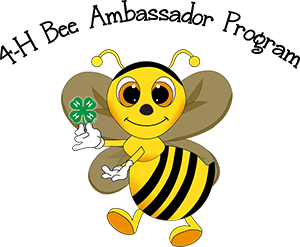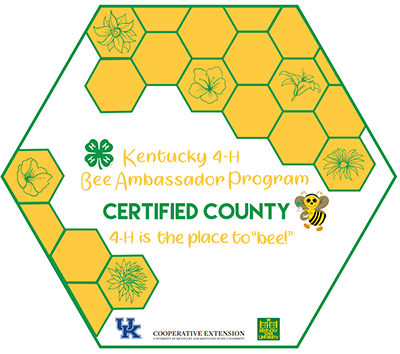4-H Bee Ambassador Program
Bee An Ambassador!
Agents: get into pollinator programming at the County Level. And not just bees... butterflies too! Want to take kids on a pollinator hike? Want to install a butterfly garden? How about a series of honey-themed baking lessons? This is the year to do it, and here are some resources to get you started!
The Place to Bee - Certified Bee Ambassador Program
Is your extension office ready to pollinate at the next level? Then take the 4-H Bee Ambassdor Challenge! If your office participates in a certain number of pollinator-related activties during any 4-H programming year, your office will be the "Place to Bee" for clients who want to learn more about bees and their pollinating cousins. To participate, download the 4-H Bee Ambassador Program manual below, and also a copy of the entry form which allows you to document your pollinattion-related activties. The manual contains multiple activties that can be used throughout the year to introduce youth to many aspects of bees and pollination, including pollinator habitats, honey tasting, and pollinator adaptations.
- 4-H Bee Ambassador Program Manual 4NB-01LO (PDF)
- 4-H Bee Ambassador Entry Form for Completed Activities (PDF)
Webinar
Ashley Osborne (4-H Extension Specialist, Natural Resources) and Blake Newton (Extension Specialist, Entomology) hosted a webinar for Kentucky 4-H Agents on Sept 6, 2017 to introduce the 4-H Bee Ambassador Program. View the recorded webinar here: https://vimeo.com/232709749
Resources
4-H St. Fair Projects
The annual honey contest is a great way for youth to learn about beekeeping. Youth raise their own bees and then collect and bottle their own honey. Find the entry rules here.
Annual Essay Contest
Each year, the Kentucky State Beekeepers Association (KSBA) holds a 4-H Beekeeping Essay Contest. Check the Foundation for the Preservation of Honey Bees website for rules and announcements for each year's contest.
Kentucky State Beekeepers Association (KSBA)
The Kentucky State Beekeepers Association is a collection of local beekeeping organizations from around the state. KSBA chapters may have resources for county offices, including educational materials and ideas. Local KSBA members are often willing to give presentaions to youth about beekeeping and pollination. KSBA also provides a limited number of grants to support educational bee hives for non-profit organizations. Thier website includes a list and a map of the many local KSBA chapters, including contact information.
Pollinator Gardens
Installing a pollinator garden (or LOTS of pollinator gardens!) in your county is one of the best things you you can do for pollinators and pollinator education.
- Growwise Pollinator-Friendly Plants
University of Kentucky entomologists worked with Growwise, a bee and pollinator advocacy group, to create a list of pollinator-friendly plants for the Ohio Valley region. Check out the list here: http://growwise.org/wp-content/uploads/2017/02/HRI-Pollinator-BeePlantLists-February2017.pdf -
Lexington Kentucky "Plant By Number" Pollinator Gardens
These plans (developed by the Lexington-Fayette Urban County Government) make it easy to plan polinator gardens for different locations and growing conditions (sun, shade, wet soil, etc). While these plans were developed for Lexington, they will be useful for many other parts of the state as well.
https://www.lexingtonky.gov/plant-numbers-0
Monarch Butterfly Conservation
Monarch butterflies need our help! They are the only migratory butterfly in the United States, and their populations are dwindling. You can install a Monarch Waystation, which is a small pollinator garden that provides monarchs (and other pollinators) with valuable food. Or you can "tag and release" monarchs, which helps scientists to monitor their populations. UK Entomology can give you tips on how to accomplish either of these projects; contact Blake Newton. Read more below!
Monarchs on The Move
Monarchs on the Move is a 4-H curriculum from Iowa State that focuses on monarch butterflies, including their role in pollination.
Kentucky Pollinator Protection Plan
In 2017, stakeholders from around the Commonwealth worked together to build a comprehensive plan to help protect pollinators that focuses on best practices that facilitate the preservation and creation of pollinator habitat. The 4-H Bee Ambassador Program was developed in support of this plan. Download and read the plan to learn more about statewide goals for pollinator protection:
Certified Counties
The following counties are pollinator ready! Check out the programs that they developed.
- Adair County: Adair County Extension installed and continues to maintain 2 demonstration honey bee hives.
- Breckinridge County: The Breckinridge County 4-H Bug Club installed two working honey bee hives at a local farm and a pollinator garden at the extension office. They also engaged in activities from the 4-H Bee Ambassador manual, including Bee Safe and Pollination and Foods. In the 2019-2020 season, Breckinridge County taught additional lessons from the Bee Ambassador manual to several audiences (including 4-H Bug Club, Jr. Master Naturalists, and local 4th graders) and created and distributed pollinator-themed grab-and-go activities.
- Butler County: Butler County installed an observation honey bee hive.
- Crittenden County: In addition to pollination education activities, Crittenden County installed a working bee hive, a honey extractor, and a pollinator garden at their extension office.
- Floyd County: Floyd County created two demonstration hives and purchased two honey extractors for their office. They also installed pollinator-friendly garden plots and engaged in pollinator education.
- Grant County: Grant County installed multiple monarch waystations at area elementary schools.
- Henry County: Henry County presented monarch butterfly lessons at local schools and installed 13 mason bee houses. They also initiated a Pollinator Garden Project with their Natural Resources Club.
- Johnson County: Along with other programs (including pollinator-themed grab-and-go kits and workshops), Johnson County installed a pollinator garden at their Extension Office.
- Kenton County: Kenton County brought live monarch caterpillars to local K-12 students, who were able to observe the caterpillars as they went through their metamorphosis. Kenton County also hosted day camps that included activities related to bees and pollination.
- Livingston County: In addition to multiple pollinator lessons at a variety of events, Livingston County installed two honey bee hives and a honey extractor at their extension office.
- McCreary County: McCreary County maintains two honey bee hives at a local school along with a honey extractor at the extension office. The county's 4-H Bee Club is also very active with activities that promote cooking with honey, wax products, and general beekeeping.
- Nelson County: In addition to multiple presentations on pollinators, Nelson County distributed pollinator kits at local farmer's markets, installed Monarch Waystations at multiple locations, and made honey extraction resources available at the County Extension office. Nelson county also integrated technology and bees by developing a Honeybee Robotics Challenge for their Robotics Club.
- Pendleton County: Pendleton County maintains a demonstration honey bee hive and also engaged in honey bee education at their local farmer's market.
- Robertson County: Robertson County installed mason bee houses.
- Whitley County: Whitley County installed 2 demonstration bee hives and made a honey extractor available at their County Extension office.


